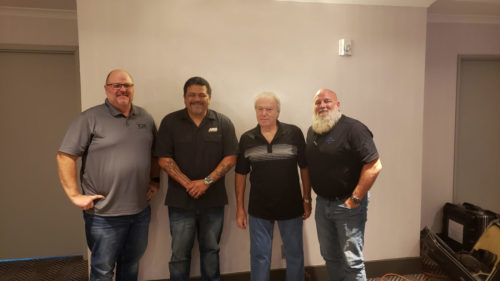
ABS Floor Covering is now an ICRI Certified Testing Company

Recently ABS’s John C. Salinas traveled to Atlanta and acquired his Certified Concrete and Slab Moisture Testing Technician Certification
(CCSMTT) thereby allowing ABS to now perform certified testing.
ABS can also be utilized as a certified 3rd party testing agency on projects or installations whereby we are not the flooring installation company. Our services are not only available here locally in the Valley of the Sun but also across all the southwest.
THE FOLLOWING ASTM TESTS ARE NOW PERFORMED BY ABS FLOOR COVERING:
ASTM F710 – PH/ Alkalinity Test
ASTM F1869 – Calcium Chloride Test
ASTM F2170 – In situ probe Relative Humidity Test
ASTM 2659 – Electronic Moisture Meter Test
ASTM F3191 – Concrete Porosity Test
WHAT is slab moisture and vapor emissions?
-Although many people use the terms “concrete” and “cement” interchangeably, one is actually part of the other. Cement is the powder that is mixed with water, sand, and aggregate to create concrete. When cement is added to these ingredients, a chemical reaction takes place that binds them together and forms a concrete substrate. Depending on the thickness of the concrete pour and environmental factors, such as ambient temperature and the humidity of the air, concrete typically takes several weeks to cure. Even after this time, a cured concrete substrate can still contain almost two-thirds of the moisture from the original mixture. This amount of water is too much for a coating system to adhere properly to the surface. Over time, the concrete continues to dry through moisture vapor transmission. The pressure within the porous substrate draws moisture up through capillary action to the surface of the slab where it evaporates into the atmosphere. The only way to determine if concrete is dry enough to receive a coating system or if moisture mitigation is necessary is by conducting moisture testing. It is not uncommon to also find high moisture vapor emission from older concrete slabs. This can be due to poorly placed, damaged or missing moisture barriers beneath the concrete slab. Ground water can penetrate the concrete slab, move through the capillaries in the concrete and cause damage to the floor covering. This can even be a seasonal issue when the water table rises or there is an increased irrigation of the landscaping. Plumbing leaks in the concrete slab can also be a source of moisture. This can increase the moisture and relative humidity of the slab, making this an issue found in both remodel and new construction projects.
WHY PERFORM CERTIFIED SLAB MOISTURE TESTING?
– To HONOR all warranties. The great majority of flooring manufacturers will not honor their warranties without pre-installation slab moisture testing. Additionally, licensed flooring installers reserve the right to refuse to install without moisture testing and or request waiver’s that protect them from failures/damages to any floor deriving from slab moisture issues, whereby no testing was performed prior to install.
-To ensure that the appropriate products are being utilized. It is vitally important to test your concrete slab’s moisture before installing flooring over it. The definitive test is with ASTM F1869 or a ASTM F2170. Testing with either method will tell you how precisely how much moisture is present, making it possible to choose a surface flooring that is appropriate. Flooring manufacturers rate their products based on the moisture levels they can tolerate, and testing your slab can tell you if a particular flooring material is likely to perform adequately.
-Integrity preservation and quality control. It makes no sense to spend thousands and thousands of dollars on a flooring installation without first ensuring that the slab substrate is suitable and READY to receive floor coverings. Otherwise, the quality and integrity of the install is subject to severe compromise and many a time, remediation. ICRI is the industries most respected and well-known certification due to its level of training and instruction. Having an ICRI certified tester will ensure that you are getting the industry’s most recognized testing applications.
WHO IS RESPONSIBLE FOR MOISTURE TESTING A SLAB?
-CLIENT has the responsibility of providing a flooring subcontractors with a suitable and acceptable slab for installation. A suitable floor would include any slab that has had slab moisture testing performed on it prior to any installation of flooring.
WHO SHOULD PERFORM THE MOISTURE TESTING?
-In the same manner that concrete placement companies are not allowed to perform their own “sump,” testing, the same ethic is endorsed in the flooring division of construction. While companies may have the certifications and expertise to perform ASTM testing on their own installations, it is advised to utilize a 3rd party in the spirit of sustaining the utmost integrity of any given scenario. Preferably, an ICRI certified 3rd party.
WHEN SHOULD MOISTURE TESTING BE PERFORMED?
-Only after an environment has been acclimated (HVAC) to standard operating conditions for a minimum of 48 hours. Moisture emission is contingent upon vapor pressure differences between the substrate and room interior. Temperature and humidity together create a specific static vapor pressure. Concrete slabs often have a much higher static vapor pressure than a room interior. Therefore, in order to accurately measure the potential for a floor system failure, it is necessary to test for vapor emission in respect to the operational-climate of the building.
Connect With Us!
Request a Call Send an Email
